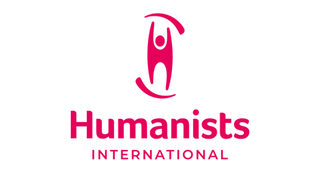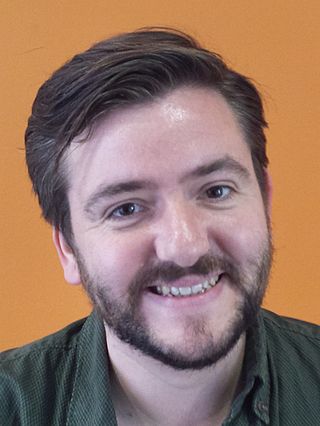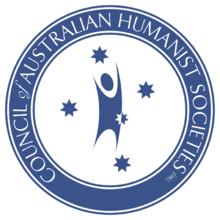Secularism is the principle of seeking to conduct human affairs based on naturalistic considerations, uninvolved with religion.

Secular humanism is a philosophy, belief system, or life stance that embraces human reason, logic, secular ethics, and philosophical naturalism, while specifically rejecting religious dogma, supernaturalism, and superstition as the basis of morality and decision-making.

Religious humanism or ethical humanism is an integration of nontheistic humanist philosophy with congregational rites and community activity that center on human needs, interests, and abilities. Religious humanists set themselves apart from secular humanists by characterizing the nontheistic humanist life stance as a non-supernatural "religion" and structuring their organization around a congregational model.

The National Secular Society (NSS) is a British campaigning organisation that promotes secularism and the separation of church and state. It holds that no one should gain advantage or disadvantage because of their religion or lack of it. It was founded by Charles Bradlaugh in 1866.

Humanists UK, known from 1967 until May 2017 as the British Humanist Association (BHA), is a charitable organisation which promotes secular humanism and aims to represent "people who seek to live good lives without religious or superstitious beliefs" in the United Kingdom by campaigning on issues relating to humanism, secularism, and human rights. It seeks to act as a representative body for non-religious people in the UK.
A Secular Humanist Declaration was an argument for and statement of support for democratic secular humanism. The document was issued in 1980 by the Council for Democratic and Secular Humanism (CODESH), now the Council for Secular Humanism (CSH). Compiled by Paul Kurtz, it is largely a restatement of the content of the American Humanist Association's 1973 Humanist Manifesto II, of which he was co-author with Edwin H. Wilson. Both Wilson and Kurtz had served as editors of The Humanist, from which Kurtz departed in 1979 and thereafter set about establishing his own movement and his own periodical. His Secular Humanist Declaration was the starting point for these enterprises.

Humanist Manifesto is the title of three manifestos laying out a humanist worldview. They are the original Humanist Manifesto, the Humanist Manifesto II (1973), and Humanism and Its Aspirations. The Manifesto originally arose from religious humanism, though secular humanists also signed.

The Norwegian Humanist Association is one of the largest secular humanist associations in the world, with over 130,000 members. Those members constitute 2.3% of the national population of 5.47 million, making HEF by far the largest such association in the world in proportion to population. The association publishes the magazine Fri tanke.

Humanists International is an international non-governmental organisation championing secularism and human rights, motivated by secular humanist values. Founded in Amsterdam in 1952, it is an umbrella organisation made up of more than 160 secular humanist, atheist, rationalist, agnostic, skeptic, freethought and Ethical Culture organisations from over 80 countries.

The Secular Coalition for America is an advocacy group located in Washington D.C. It describes itself as "protecting the equal rights of nonreligious Americans."

Religion in Australia is diverse. In the 2021 national census, 43.9% of Australians identified with Christianity and 38.9% declared "no religion".

The Atheist Foundation of Australia (AFA) was established in South Australia in 1970, when The Rationalist Association of South Australia decided upon a name change to better declare its basic philosophy, namely atheism.
The Rationalist Society of Australia (RSA) promotes the interests of rationalists nationally in Australia. Originally formed as the Victorian Rationalist Association, the society originated in a meeting of freethinkers in the University of Melbourne in 1906. It is the operational arm of the rationalist movement in Australia.

The following outline is provided as an overview of and topical guide to humanism:

The European Humanist Federation, officially abbreviated as EHF-FHE, was an umbrella of more than 60 humanist and secularist organisations from 25 European countries.

Atheism, agnosticism, scepticism, freethought, secular humanism or general irreligion are increasing in Australia. Post-war Australia has become a highly secularised country. Religion does not play a major role in the lives of much of the population.

Andrew James William Copson is a humanist leader and writer. He is the Chief Executive of Humanists UK and the President of Humanists International. He has worked for a number of civil and human rights organisations throughout his career in his capacity as executive committee member, director or trustee and has represented Humanist organisations before the House of Commons, the Organization for Security and Co-operation in Europe and the United Nations. As a prominent spokesperson for the Humanist movement in the United Kingdom he is a frequent contributor to newspaper articles, news items, television and radio programmes and regularly speaks to Humanist and secular groups throughout Britain. Copson has contributed to several books on secularism and humanism and is the author of Secularism: Politics, Religion, and Freedom.
Irreligion in the United Kingdom is more prevalent than in some parts of Europe, with about 8% indicating they were atheistic in 2018, and 52% listing their religion as "none". A third of Anglicans polled in a 2013 survey doubted the existence of God, while 15% of those with no religion believed in some higher power, and deemed themselves "spiritual" or even "religious".
Norway is a comparatively secular nation which no longer has a state religion, though 68.7% of the 5.4 million population belong to the Church of Norway.










